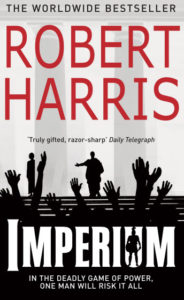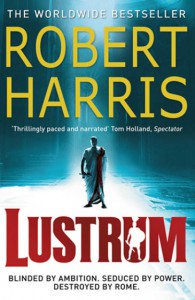Books
An introduction to the Cicero trilogy
The Cicero Trilogy – Imperium, Lustrum and Dictator – tells the story of the life of the great Roman orator and statesman Cicero, imagined in the form of a biography written by his secretary, Tiro. That there was such a man as Tiro and that he wrote such a book are well-attested historical facts. Born a slave on the family estate, Tiro was three years younger than his master but long outlived him, surviving, according to Saint Jerome, until he reached his hundredth year.
‘Your services to me are beyond count,’ Cicero wrote to Tiro in 50 BC, ‘in my home and out of it, in Rome and abroad, in private affairs and public, in my studies and literary work…’ Tiro was the first man to  record a speech in the senate verbatim, and his shorthand system, known as Notae Tironiane, was still in use in the Church in the sixth century; indeed some traces of it (the symbol ‘&’, the abbreviations etc, NB, i.e., e.g.) survive to this day. He also wrote several treatises on the development of Latin. His multi-volume life of Cicero is referred to as a source by the first century historian Asconius Pedianus; Plutarch cites it twice. But, like the rest of Tiro’s literary output, the book disappeared amid the collapse of the Roman Empire.
record a speech in the senate verbatim, and his shorthand system, known as Notae Tironiane, was still in use in the Church in the sixth century; indeed some traces of it (the symbol ‘&’, the abbreviations etc, NB, i.e., e.g.) survive to this day. He also wrote several treatises on the development of Latin. His multi-volume life of Cicero is referred to as a source by the first century historian Asconius Pedianus; Plutarch cites it twice. But, like the rest of Tiro’s literary output, the book disappeared amid the collapse of the Roman Empire.
What must it have been like, one wonders? Cicero’s life was extraordinary, even by the hectic standards of the age. From relatively lowly origins compared to his aristocratic rivals, and despite his lack of interest in military matters, deploying his skill as an orator and the brilliance of his intellect he rose at meteoric speed through the Roman political system, until, against all the odds, he finally was elected consul at the youngest-permitted age of forty-two.
 The first novel in the trilogy, Imperium, describes Cicero’s rise to power. The second, Lustrum, tells of his crisis-stricken year in office – 63 BC – and of how his subsequent decision to oppose the so-called triumvirate earned him the enmity of Julius Caesar and led him to flee Rome. It is at this desperate point in Cicero’s fortunes that the third novel, Dictator, begins. Its story encompasses what was arguably – at least until the convulsions of 1933-45 – the most tumultuous era in human history.
The first novel in the trilogy, Imperium, describes Cicero’s rise to power. The second, Lustrum, tells of his crisis-stricken year in office – 63 BC – and of how his subsequent decision to oppose the so-called triumvirate earned him the enmity of Julius Caesar and led him to flee Rome. It is at this desperate point in Cicero’s fortunes that the third novel, Dictator, begins. Its story encompasses what was arguably – at least until the convulsions of 1933-45 – the most tumultuous era in human history.
My aim has been to describe, as accurately as I can within the conventions of fiction, life in Ancient Rome as it might have been experienced by Cicero and Tiro. Wherever possible, the letters and speeches and descriptions of events have been drawn from the original sources. However, these are novels, not works of history: wherever the demands of the two have clashed, I have unhesitatingly given in to the former.


1 Comment
Please note: Moderation is enabled and may delay your comment being posted. There is no need to resubmit your comment. By posting a comment you are agreeing to the website Terms of Use.